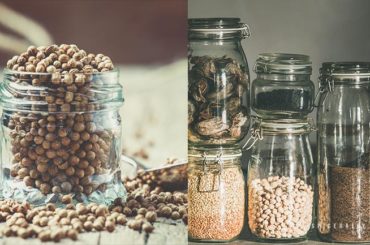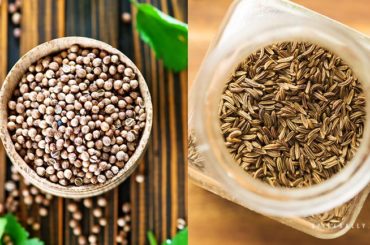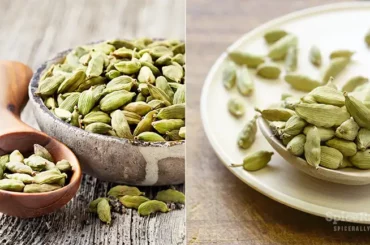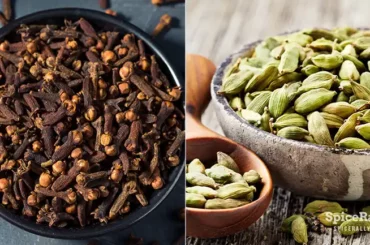Warm and comforting nutmeg is one of the most aromatic spices that bring the nostalgic beats of holiday goodies. So, this episode is going to be all about this spice, and we will dive right into all its ins and outs!
Nutmeg derives from the fruit of the Myristica fragrans tree. The fruit itself holds two spices: nutmeg and mace. This is widely used as a whole seed or powdered in cooking. This incredibly fragrant, warm spice has nutty and sweet elements.
If nutmeg is among your favorite spices, read along as we will cover everything nice about this mighty ingredient!
What Is Nutmeg? Is Nutmeg A Spice?
The hard, oval-shaped spice, or the reddish-brown powder we incorporate into our dishes as nutmeg, actually comes from the tropical evergreen tree Myristica Fragrans tree (family Myristicaceae), which is native to the Molucca Islands (also known as The Spice Islands) of Indonesia.
Nutmeg is the seed of the fruit of this tree. In fact, this fruit is complexly-formed with three edible parts. And they are:
- The peel of the fruit
- The outer coating of the seed- Mace
- The seed kernel- Nutmeg
The peel of the ripened or unripened fruit is less known to be edible and is often thrown after the seed is extracted. Yet, countries like India and Sri Lanka effectively add this peel to their diet as a curry, juiced, as wine, made into a jam, or some even eat it raw with a pinch of salt and chile powder. This fruit itself has a distinctive taste with a tart, fruity, and slightly astringent mouthfeel.
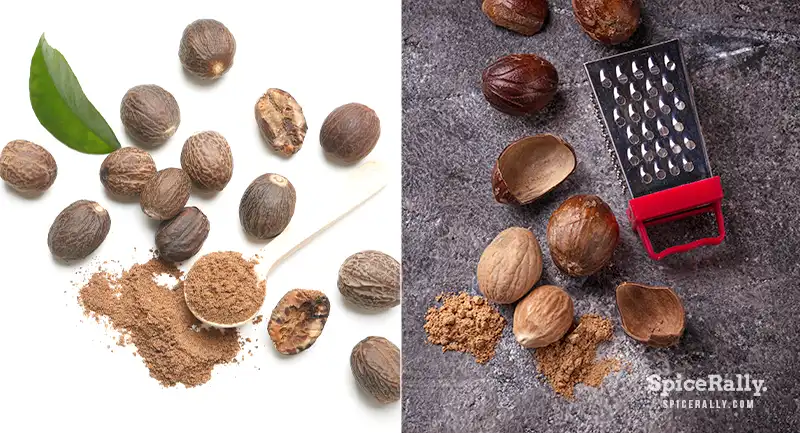
Processing Of Nutmeg
Once the fruit is ripened, the seed is extracted, which typically comes with a hard outer shell. This seed is gradually dried under the sun for six to eight weeks. During this time, the nutmeg withdraws from its shell. We know the spice is ready once the kernels rattle in their shells when shaken. It is then carefully separated from the outer, lacey coat (the mace) and used whole or ground.
Mace is categorized as a different spice. In commercial preparation, mace is packaged separately as whole mace florets or powdered. Even though it comes as a part of nutmeg, mace tends to be milder and less intense than nutmeg. However, it holds a sweeter flavor, with citrus, black pepper, cinnamon, and pine notes.
How Does Nutmeg Taste And Smell Like?
The flavor and fragrance of nutmeg virtually remind us something about holidays or wintry, seasonal delicacies, even though we don’t know about the spice specifically. It is a warm spice with a nutty, slightly woody, spicy, and sweet aftertaste. It can be considered one of the most aromatic spices since it holds a potent, spicy, and assertive aroma.
How Spicy Is Nutmeg?
Nutmeg is known for its warm spiciness. In fact, powdered nutmeg is much bolder than the whole nutmeg seed, offering an epic zest to a certain dish, even with a small amount. However, the intensity of this spice enhances with the association of complementary spices like cloves, cinnamon, and allspice.
Forms Of Nutmeg
Nutmeg is widely used as a whole seed and in its ground form in cooking and baking. In addition, you can also find nutmeg essential oil, nutmeg butter, and nutmeg liquid extract, which are used for different purposes.
A Brief Look Through To The Origin And History Of Nutmeg
The sources claim that there is proof that both nutmeg and mace were found as early as the 1st century A.D. when Roman author Pliny articulated a tree-bearing nut with two flavors. Belatedly, Emperor Henry VI had the streets of Rome cleansed with nutmegs prior to his coronation.
In the 6th century, nutmegs were shipped by Arab vendors to Constantinople. But it was in the 1600s when nutmeg became esteemed for initiating wars. The Dutch executed a bloody battle, including the massacre and enslavement of the residents of the island of Banda, just to prevent nutmeg production in the East Indies.
And later, during conciliation over the Island of Manhattan, the Dutch exchanged the island for dominion over a nutmeg-producing island held by the British. The Dutch had the authority over the spice islands until World War II.
How To Use Nutmeg?
Like most other culinary spices, nutmeg is also a useful household ingredient. While the distinctive flavor and aroma of nutmeg introduce a new flavor dimension to a variety of foods, it is also used as an effective folk medicine, especially in Asian countries.
Culinary Uses Of Nutmeg
Nutmeg has a great culinary history and can feature in both sweet and savory recipes. It can be used whole and grated straight into a dish or shaken or measured from a container of pre-ground nutmeg.
How To Use The Whole Nutmeg Seed?
The whole seed is seldom used as it is, even if a certain recipe calls for the whole nutmeg. Thus, the seed is often broken into pieces before being incorporated into the dishes and removed later.
The best flavor of nutmeg is obtained when it is freshly grated from the seed. And, to use the whole nutmeg this way, you will require a nutmeg grater or a Microplane to shave off a small amount of the seed. Whole seeds are used in dishes such as:
- Spice blends like Garam Masala, Ras el Hanout, Baharat, etc.
- Creamy and cheesy dishes
- Fresh smoothies and making infused teas
- Soups and stews
- To make puddings and other sweets
How To Use Nutmeg Powder/ Ground Nutmeg?
Ground or powdered often comes in smaller quantities since there’s a higher probability of losing its flavor and aroma than any other spice. However, it can be incorporated into the dishes like all other ground spices.
When including nutmeg, make sure to use it sparingly, as this robust spice can easily dominate the flavors of a dish. Nutmeg powder can be used in the following ways:
- Spice blends, seasoning mixtures, and spice rubs
- To flavor sauces, gravies, and dressings
- It can be incorporated into rice dishes, meat, fish, seafood, and vegetable dishes.
- Added to flavor ground meat mixtures
- Used to flavor baked goods, breakfast meals, and drinks
What Is Nutmeg Butter?
Nutmeg Butter is a yellow, creamy, semi-solid butter that has been extracted from the nutmeg fruit. Generally, it comes as soft, granular bits and has a low melting point.
Nutmeg butter possesses the lovely, warm, and spicy aroma of nutmeg. Traditionally, diluted nutmeg butter is used to calm skin irritations and annihilate rheumatic pain. In addition, this is also used in the following beauty products:
- Creams
- Soaps
- Lip balms
- Creams
- Shampoo
- Body butters
- Bath bombs
- Conditioners
- Hair pomades
Nutmeg Essential Oil
Nutmeg essential oil is a volatile liquid that has a thinner consistency and pale yellow in color. It gives a robust, spicy scent with a distinctive, lovely, musky undertone.
Thanks to the numerous therapeutic qualities in nutmeg essential oil, it is included in a wide range of beauty and hair products, along with oral and dental care products. It is also commonly used in aromatherapy and as a natural deodorizer in oil diffusers and humidifiers.
Medicinal Uses Of Nutmeg
Nutmeg is highly valued and indigenously used in the Ayurveda and Siddha system of medicine. It has been used in traditional medicine since ancient times due to the superabundance of therapeutic elements it contains.
And Asians, particularly Indians and Sri Lankans, have been using a concoction made with grated nutmeg mixed with fresh lime juice over centuries as a folk medicine for digestive-related issues. Moreover, this spice is also known to be an effective home remedy for acne, insomnia, anxiety and the essential oil for erectile dysfunction.
Other Health Benefits Of Nutmeg
Nutmeg includes powerful anti-inflammatory, anti-microbial, pain-relieving, cleansing, and energizing qualities. The sources claim that nutmeg is a rich source of fixed and essential oil, triterpenes, and assorted types of phenolic compounds.
Accordingly, scientific backed data prove that nutmeg has the following health benefits when consumed moderately:
- Alleviates conditions related to chronic inflammation
- Boosts libido in both men and women while helping with erectile dysfunction
- Fights against harmful bacteria
- Boosts mood and helps with cognitive function
- Aids with heart health
- It helps to maintain healthy blood sugar levels while preventing diabetes.
Substitutes For Nutmeg
The cozy nutmeg flavor is pretty unique, and you might be wondering if there isn’t anything that could replace its flavor if you run short of this spice or don’t like the original taste. Luckily, a few pantry staples could be used instead of whole nutmeg seeds and ground nutmeg. And they are:
- Mace
- Allspice
- Ginger
- Cinnamon
- Cloves
- Pumpkin pie spice mix
- Apple pie spice mix
How To Grow Nutmeg?
Nutmeg is a tropical, evergreen tree with multiple stems that reaches heights from 30 to 60 feet tall. Since they are tropical plants, they can be effortlessly grown in USDA zones 10 and 11.
They thrive best in hot and sunny locations with some spotty shade. Nutmeg trees should be grown in rich, organic soil with a medium consistency and low saltiness.
Once the tree flowers, the fruit is ripe (marked by the cracked husk) and prepared for harvest between 150 and 180 days after planting. These trees produce up to 1,000 fruits annually.
Is Nutmeg Keto-Friendly?
Nutmeg is a single-element spice that derives directly from a plant. So, like most other spices, nutmeg also can be a healthy addition to your ketogenic diet.
Is Nutmeg Vegan?
Nutmeg comes from a plant, so it is naturally vegan-friendly. But, if you are a strict vegan who is concerned about things like the packaging that this spice comes in, you should be prudent of them in detail. However, nutmeg alone is a safer option if you track a vegan diet.
Is Nutmeg Gluten-Friendly?
Like most other spices, nutmeg is considered safe to consume if you are sensitive to gluten, following a gluten-free diet, or have a condition like Celiac disease.
How To Store Nutmeg? (Storing and Shelf Life)
Ground nutmeg should be stored in a tightly-sealed spice container/ shaker/ jar and kept from direct heat, light, and moisture. And ground nutmeg will retain its freshness, flavor, and aroma when stored appropriately for about six months.
The whole nutmeg will stay fresh for an unlimited period. However, you should keep them inside a well-sealed container and always store them away from heat and moisture. Refrigerating is not recommended for both ground and whole nutmeg. Instead, you can keep them with the rest of your dry spices inside your spice cabinet or in your pantry.
Moreover, it is important to remember that buying whole nutmeg seeds is the best option because freshly grated nutmeg provides the best flavor and aroma.
Nutmeg Is A Spice That Embraces You Warmly, Filling Your Kitchen With a Wintry Aroma!
Incredibly fragrant, nutty, warm, spicy, and sweet nutmeg bestows the ultimate distinctive taste to a wide variety of dishes, including sweet, savory, or beverage preparations. This spice is a widely consumed ingredient in many parts of the world, known for its flavor and therapeutic qualities.
So, consider yourself lucky if you already have nutmeg in your pantry. And, if you don’t, note down to make this spice one of your pantry staples immediately!

